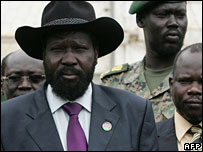 Supporters of the Egyptian revolution will be glad to know that Omar Al-Bashir, president of Sudan and supporter of democracy everywhere (except Darfur, South Sudan, East Sudan, eastern Chad, Eritrea, northern Uganda…you get the picture) has given the Egyptian revolution his blessing, with the gift of 5000 head of cattle (worth over $1 million, depending on the state of the cows). The cows began the trek from Khartoum to the Egyptian border on Monday, coinciding with the visit of Egypt’s prime minister Essam Sharaf (himself, incidentally, completely unelected). The two leaders talked about water. Specifically, about the Nile Basin Initiative. If Sudan and Egypt lose any significant portion of the Nile waters to the upstream countries, on which they both depend, they’re up shit creek without a paddle. Except the creek will be dry.
Supporters of the Egyptian revolution will be glad to know that Omar Al-Bashir, president of Sudan and supporter of democracy everywhere (except Darfur, South Sudan, East Sudan, eastern Chad, Eritrea, northern Uganda…you get the picture) has given the Egyptian revolution his blessing, with the gift of 5000 head of cattle (worth over $1 million, depending on the state of the cows). The cows began the trek from Khartoum to the Egyptian border on Monday, coinciding with the visit of Egypt’s prime minister Essam Sharaf (himself, incidentally, completely unelected). The two leaders talked about water. Specifically, about the Nile Basin Initiative. If Sudan and Egypt lose any significant portion of the Nile waters to the upstream countries, on which they both depend, they’re up shit creek without a paddle. Except the creek will be dry.
The cows are just one part of Bashir’s strategy of ingratiating himself with Egypt’s new leaders, which began with a visit to Cairo at the beginning of the month. Since Mubarak fell, his government has been very critical of the Mubarak regime, claiming that they’d been a victim of ‘blackmail’ ever since Mubarak narrowly survived an assassination attempt in Khartoum. This is all posturing; Bashir would have been very unsettled by Mubarak’s departure. For a dictator, any form of people power is far more dangerous than another dictator, no matter how much they do or do not get along.
VERDICT: Omar Al-Bashir goes 4th; he’ll have to try a lot harder to impress his more sophisticated Egyptian colleagues than that. And no, camels won’t cut it either.







